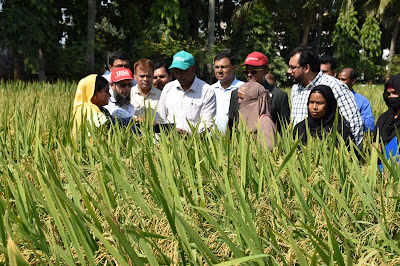Madhupur Farm, Tangail, the Bangladesh Agricultural Development Corporation (BADC), and the International Rice Research Institute (IRRI) organized crop cafeterias to facilitate the scientific evaluation and selection processes of 37 new rice varieties by different stakeholders on 11 November 2023 in Dhaka.
These included 27 new inbred varieties released by the Bangladesh Rice Research Institute and Bangladesh Institute of Nuclear Agriculture (BINA) and 10 hybrid rice from five private seed companies in Bangladesh. These were evaluated by men and women farmers, dealers, millers, private seed companies, officials from BADC and the Department of Agricultural Extensions, and researchers from BRRI, BINA, and IRRI.
Crop cafeterias have been proven to be an efficient way to disseminate high-yielding varieties and agricultural innovations. They also provide a forum among the different stakeholders in the rice sector for discussion, learning, decision-making, and feedback on their performance under local conditions.
Furthermore, plant breeders and researchers can benefit from evidence-based trait preferences collected at these hubs. The information farmers and other stakeholders provide can offer valuable insights for varietal development or improvement programs.
Customer preference is the primary driver of a rice variety's appeal, according to Abdullah Sazzad, chairman of BADC. Working people favor a rice variety that, when cooked in the morning, keeps well into the evening.
Furthermore, crop cafeterias assist in creating connections between the public and private seed sectors and formal and informal seed networks. For example, rice millers have a significant role in creating demand for a rice variety. Around 48 metric tons of rice are fed into an automatic rice grinder in a single batch. Millers are not willing to purchase any variety if the quantity of rice is less than that. For this reason, millers may require a specific variety to be mass-cultivated in a single location. It establishes and controls varietal supply and demand and stabilizes the seed-supply chain management process.
The IRRI Bangladesh Seed System Team also collaborated with several partner organizations to conduct on-farm trials and demonstrations for identifying and promoting promising varieties through stakeholder engagement. These efforts are supported by CGIAR Seed Equal Initiative and IRRI’s OneRice Breeding Strategy.
In addition to seed systems, Mr. Sazzad pledged to collaborate with IRRI on postharvest technology, irrigation management, and developing a skilled labor force.
###
Learn more about IRRI (www.irri.org) or follow us on social media and networks (all links down the right column).


.jpg)
No comments:
Post a Comment